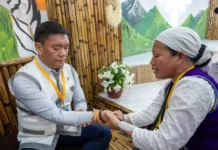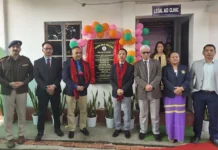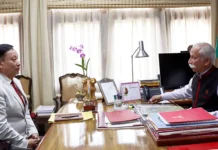Monday Musing
[ Amar Sangno ]
They say that the beauty of a true democracy lies in debates, discussions and disagreements. Democracy is incomplete when these components are missing in the legislative assembly or the Parliament, thereby deeming them unfit to be called ‘temples of democracy’.
Counter-arguments, fist-thumping, name calling, finger wagging, and sloganeering on the floor of the House are ingredients of a parliamentary form of democracy, as a noisy hall is healthier than a muted legislative assembly on socio-cultural and economic issues.
The legislative assembly and the Parliament are revered by the people for a reason. The people mandate legislators and parliamentarians to represent them and speak up for them on pressing issues in the temple of democracy. As the father of the Indian Constitution Dr BR Ambedkar once said, “Democracy is not only about voting, it’s about people’s voices are heard.”
Do our legislators live up to our expectations in the legislative assembly? An absolutely big no-no.
No debate over any bill or the state’s budget deficit ever happened since 2019, and the majority of the bills are passed by voice vote, without discussion. It is doubtful whether our legislators ever read the technical details of the bill and budget copies thoroughly.
When a bill becomes an Act without debate, it can put the system in danger, and defective legislation could drive democracy into peril.
On average, 95 percent of our legislators have a debate participation count of below 10 percent. Barring a few legislators, like Congress MLAs Ninong Ering and Wanglin Lowangdong, who make the assembly interesting, most of them sit muted throughout the session. Even the women legislators, who represent the weaker section of the society, hardly participate in any debate.
Most of the supplementary and starred questions that the legislators ask the minister concerned about are either community-based or constituency-centric, rather than about pan-state interests.
No wonder our state’s legislative assembly has a history of weak opposition leaders. The tradition has never been broken ever since the first election was held in 1978, paving the way for student organisations to act as the principal opposition party outside the assembly.
Initially, the atmosphere of the 12th session of the 7th legislative assembly appeared somewhat electrifying as Congress MLA Ering made a startling announcement that he would be tabling a private member bill for the introduction of the Arunachal Pradesh Monogamy Election Eligibility Bill, 2023, on 4 September.
It gave a glimmer of hope to the women activists who proposed that the bill would force aspiring legislators to practise monogamy. On the third day of the session, the public gallery was filled with enthusiastic and optimistic women activists to witness the historic debate over the much touted bill.
A pall of dejection fell upon them when they came to know that Ering later withdrew the bill under mysterious circumstance. Ering later sought to justify his stance, stating that a bill needs 2/3rd majority in Parliament for amendment, as it refers to the People’s Representation Act, 1951.
“History will remember 6 September, 2023, when the voice of the women was butchered by the so-called elected leaders. This day will be considered the darkest day of the women’s movement in Arunachal Pradesh because our voice was murdered. History will be written about this assembly session in the days to come,” said advocate Kani Nada Maling, who is also the president of the Arunachal Pradesh Women’s Welfare Society.
Who made our legislators caged parrots? The voters, of course.
The people of Arunachal do not vote for developmental or issue-based matters; they vote based on community, clan, contractual works, government jobs and, more importantly, money. After splurging Rs 60 crore in the election, who would dare to ruffle the feather by pointing a finger at the government and demanding accountability?
It is obvious that the voters play their part in weakening the legislators as well as democracy in a parliamentary form of government.
“They (legislators) are our own products. They represent voters’ mentality and aspirations. We don’t vote on issues or discussions in the assembly. So the legislators prefer thinking about schemes and funds, rather than participating in a debate or discussion. The keys of the funds and schemes are with the chief minister,” said Rajiv Gandhi University’s Political Science HoD Prof Nani Bath.
Indeed, all legislators, be they opposition or ruling, want to be on the safe side of the government. Thus, silence is the only key to be safe for the next election.




